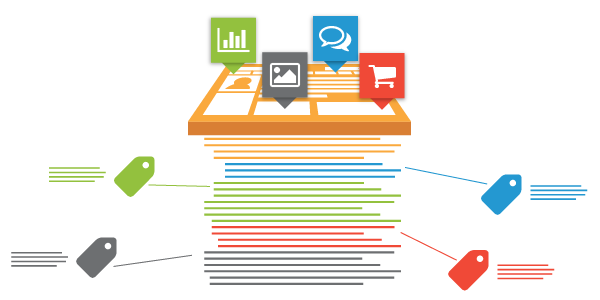A tag is a brief snippet of code, generally provided by a third-party vendor, that businesses place on their website to collect data for analytics and digital marketing tools. Using tag management software for small businesses can help them simplify and streamline their processes of managing and maintaining their various tags.
But, selecting the ideal tag management software can be a daunting task when there are so many options. Therefore, to help you out, we at SaaSworthy have put together a list of the top 8 tag management software for small businesses in 2022.
Table of Contents
What is Tag Management Software?

A tag management software (TMS) is a software that enables you to deploy all of your website’s tags through a single container tag. Marketers can use tag management software to centralize and standardize the process of changing tags, thereby reducing their reliance on IT or development teams.
A TMS can make your websites load faster by managing how your tags load, in addition to being more convenient and structured. It acts as a Content Management System for digital marketing code snippets, providing a centralized method for managing JavaScript and HTML tags.
The top 8 tag management software for small businesses in 2022
Given below in detail, along with their various features and limitations, are the top 8 tag management software for small businesses in 2022. All of these software are scalable, meaning that they can grow over time along with your small business.
1. Google Tag Manager
Google Tag Manager, launched in 2012, is a tag management software that allows for the creation, embedding, and updating of tags across websites and mobile apps. It has a handy preview feature and multi-account support and enables non-technical staff to quickly create marketing and tracking services. Google Tag Manager is SaaSworthy’s top choice as the best free tag management software for small businesses in 2022.
The various features of Google Tag Manager include
- It allows marketers to add or alter their own tags as required, and campaigns can be launched with only a few clicks, including support for bespoke tags that aren’t yet available.
- You can manage your tags with features like quick preview and debug tools, auto-event triggers, and a user-friendly interface.
- Error checking, security features, and fast tag loading guarantee that all of your tags function properly and increase cooperation throughout your organization.
- It supports all tags and offers ready-to-use templates for a variety of Google and third-party tags for web and mobile apps.
The limitations of Google Tag Manager are
- It has a steep learning curve, making it challenging for beginners to set up and navigate through it.
- The tools are not organized properly.
2. Tealium iQ
Tealium iQ is a tag management software that helps businesses acquire, monitor, and manage client data. It gives you a versatile approach with cloud or browser-based deployment. You can quickly deploy and maintain vendor tags since you have access to an ecosystem of over 1000 turnkey vendor integrations via tags and APIs. Therefore, Tealium iQ is SaaSworthy’s first choice as the best tag management software for small businesses.
The various features of Tealium iQ include
- Tealium iQ allows you to inherit attributes between site profiles, apply user-level access to critical functions, and build up numerous deployment environments for testing.
- Tealium’s global multi-CDN architecture and sophisticated vendor management provide consistently high performance while serving tags.
- The Tealium Data Layer API allows for the remote manipulation of the universal data object. Organizations can manage and insert data definitions into their websites dynamically and without scripting.
- Tealium iQ’s strong privacy capabilities enable you to design clearer, more effective data collecting rules, give website users quick opt-out options, and restrict user access.
The limitations of Tealium iQ are
- The user interface becomes slow and choppy while loading larger tag profiles.
- Some of the features and tools are not reliable due to compatibility issues.
3. Ensighten Manage
Ensighten Manage is a top tag management software for small businesses that prioritizes privacy and has over 1,000 turnkey integration. Ensighten accelerates the implementation of new technologies and improves marketing agility by reducing the dependency on IT development timelines.
Ensighten Manage is particularly suited for usage in security-focused, policy- and process-driven, highly collaborative workplaces with a wide range of web tagging needs.
The various features of Ensighten Manage include
- Ensighten Manage combines and standardizes visitor data across different sites, domains, and channels such as mobile devices, ATMs, kiosks, gaming consoles, and others.
- Ensighten provides marketers with an easy-to-use user interface for deploying and managing tags and enables marketers to reply to campaigns in real-time.
- Ensighten enables marketers to regulate when an analytics tag fires and captures all analytics data correctly. It also enables them to obtain first-party omnichannel data.
- Its innovative Hybrid-Tagging architecture handles the heavy work in the cloud and reduces data and tag code that is delivered to the client, significantly speeding up the page load.
The limitations of Ensighten Manage are
- It does not have an in-built Preview mode like its competitors.
- There are some bugs in the user interface, making it complicated to use.
4. Qubit OpenTag
Qubit OpenTag, released in 2011, is an open-source tag management software for small businesses that has its full source code on Github. It is a TMS designed for marketers, although it can be customized by developers.
It makes it easier to manage the maintenance duties involved with monitoring hundreds of vendor partnerships and their numerous tags. It is built on Qubit’s open Universal Variable data model and runs seamlessly.
The various features of Qubit OpenTag include
- It is compatible with the Qubit AB testing platform. It also offers a tag library with more than 600 tags.
- The vast tag library makes it simple to deploy tags, and code versioning makes it simple to roll back to prior versions of your containers.
- To make every customer encounter more meaningful, Qubit creates a model for each customer. Qubit combines data, intent, and design tools to help your team develop more successful consumer experiences.
- Marketers may utilize Opentag to analyze third-party point solutions and optimize important marketing channels through de-duplication.
The limitations of Qubit OpenTag are
- It lacks the reporting features present in other similar tag management software.
- The ability to copy pixels across containers is no longer available.
5. TagCommander
TagCommander by Commanders Act is a top tag management software for small businesses that are compatible with hundreds of analytics and marketing platforms globally. Its wizard-driven interface eliminates the need for technical expertise.
It has over 7,000 vendors to select from and has more than 800 turnkey templates. TagCommander allows users to track data and tags on both online and mobile platforms.
The various features of TagCommander include
- TagCommander provides a Consent Management Platform that allows businesses to be GDPR compliant by activating tags based on single user consent.
- It enables marketers to manage and install their tags, as well as harvest the data generated from them, without requiring assistance from their IT departments.
- It also regularly analyses the tag plans to assess the quality of the online property’s tagging. It alerts the user to any potential problems and suggests a solution.
- It allows you to spend less time gathering, preparing, integrating, and maintaining data and more time evaluating and making choices based on your MarTech stack.
The limitations of TagCommander are
- The de-duplication engine is not flexible enough to cater to your various needs.
- The support team takes a lot of time to respond to queries.
6. Crownpeak TagControl
Crownpeak TagControl is a tag management software for small businesses that generates leads for websites to promote them while filtering out those that are unnecessary and may constitute a security risk. It provides tools to assist you in understanding the tags on your site and how they affect performance, privacy, etc. TagControl makes it simple to disable the tags you don’t want to fire with a single click.
The various features of Crownpeak TagControl include-
- TagControl assists in swiftly determining where your vendors are causing page latency issues, which increases your bounce rate since users will not wait for your content to load.
- It assists you in assessing your compliance with legislation like the GDPR, the ePrivacy Directive, and the PIPEDA.
- TagControl gives you insight and control over every vendor tracking visitors on your website, allowing you to clean house and optimize marketing operations, strengthen security, and emphasize the user experience.
- TagControl works at the tag level, allowing you to manage access independent of how the vendor was introduced. Its trackermap function allows you to see who has access to your tags.
The limitations of Crownpeak TagControl are-
- We were not able to find any limitations during our extensive research.
7. Adobe Launch
Adobe Launch is an advanced tag management platform that aids in the unification of a business’s marketing environment. It contains an open API and a portfolio of extensions to allow data to flow throughout the user’s marketing environment.
Launch works well with both Adobe and non-Adobe applications. Adobe Launch is SaaSworthy’s recommendation as one of the best tag management software for small businesses in 2021.
The various features of Adobe Launch include-
- You can link various technologies and transform data into action with Adobe Launch, allowing you to develop powerful, memorable customer experiences.
- Launch allows you to conveniently obtain the necessary extensions in a single catalog. IT and marketers can utilize the simple user interface to set up and integrate these extensions, saving a significant amount of time.
- You receive a unified view of all the data gathered on your web and mobile businesses for improved quality control and sharing.
- It reduces the time it takes to configure sites and gets accurate data from all of your digital marketing solutions.
The limitations of Adobe Launch are-
- The documentation on how to use the software is not helpful.
- It has a steep learning curve, making it difficult for new users.
8. Tag Defender
Tag Defender by Hub’Scan is a SaaS tag management software for small businesses used to audit web analytics tags, check tagging strategies, replay customer journeys, and authenticate banner advertising campaigns. It provides insight into typical issues that might lower your website’s visibility in organic search results.
It can assist your digital marketing team with data collecting and quality assurance challenges regardless of the tags they employ.
The various features of Tag Defender include
- Tag Defender not only triggers tags and examines tag values but also ensures that the tags capture the correct data.
- You may define your tagging variable/value specification in Tag Defender and have it verified anytime you audit your site.
- Tag Defender will automatically search for digital marketing and analytics tags on hundreds of pages on your website. Scan reports show you which portions of your website are untagged and require your action.
- Once a scenario has been set, Tag Defender will monitor it on a regular basis to check that all essential tracking is in place and working properly.
The limitations of Tag Defender are
- It can get stuck while performing scans due to stability issues.
- It experiences minor bugs and glitches occasionally.
Conclusion

We hope that we were able to provide some insight into the various tag management software for small businesses available in the market. No matter how feature-rich or expensive a tag management software is, none can tick all the boxes. Therefore, you have to weigh the pros and cons of each tag management software before choosing the one that best suits the needs of your small business.
For more informative articles like this one detailing the features and limitations of the top software in each category, visit the SaaSworthy blog.




![10 Best Free and Open-Source Landscape Design Software in 2024 [Updated] SaaSworthy Blog Header](https://images.saasworthy.com/blog_latest/wp-content/uploads/2021/04/Blog-Header-Image.png)

